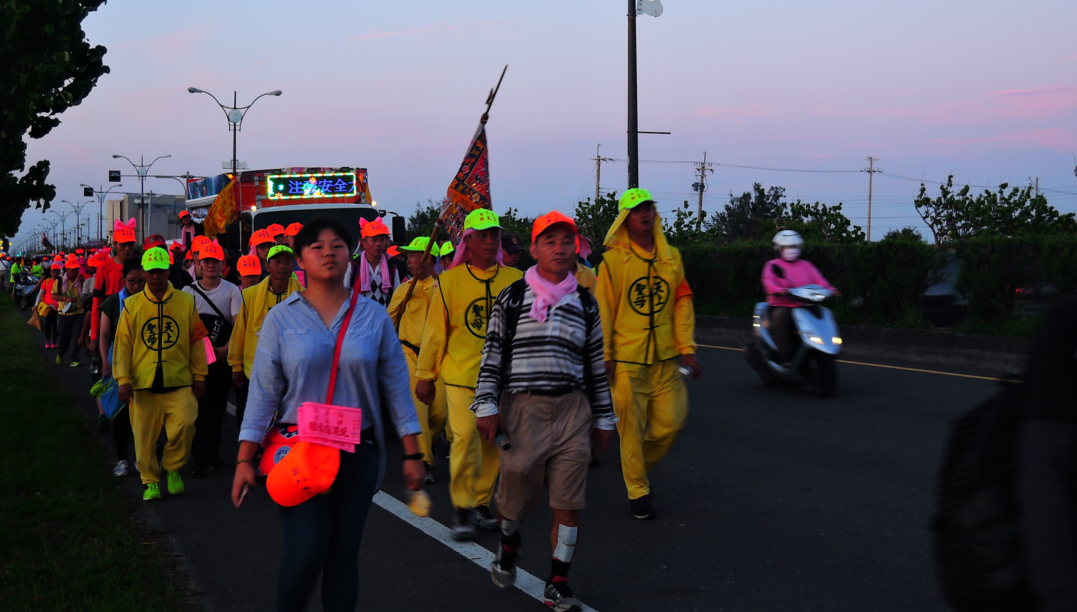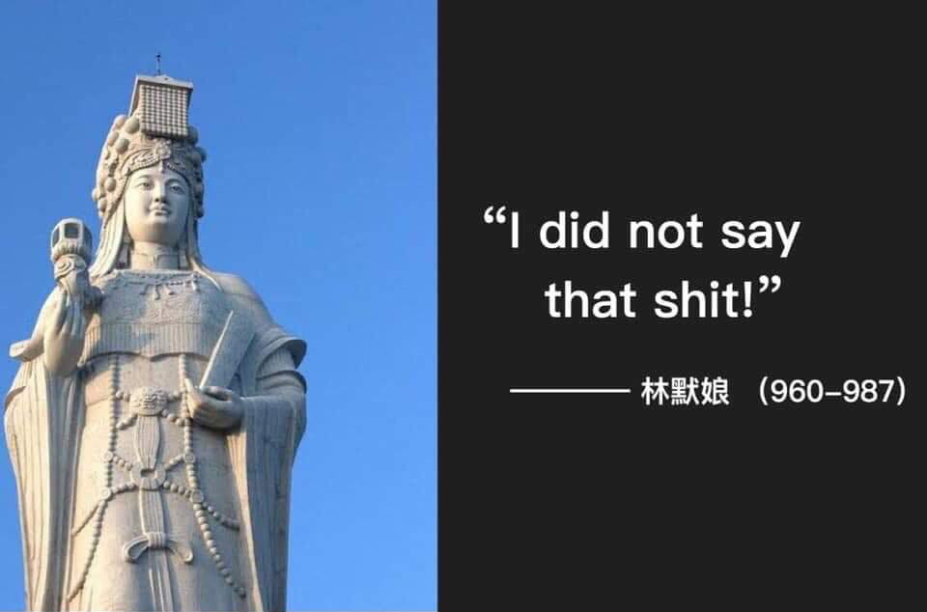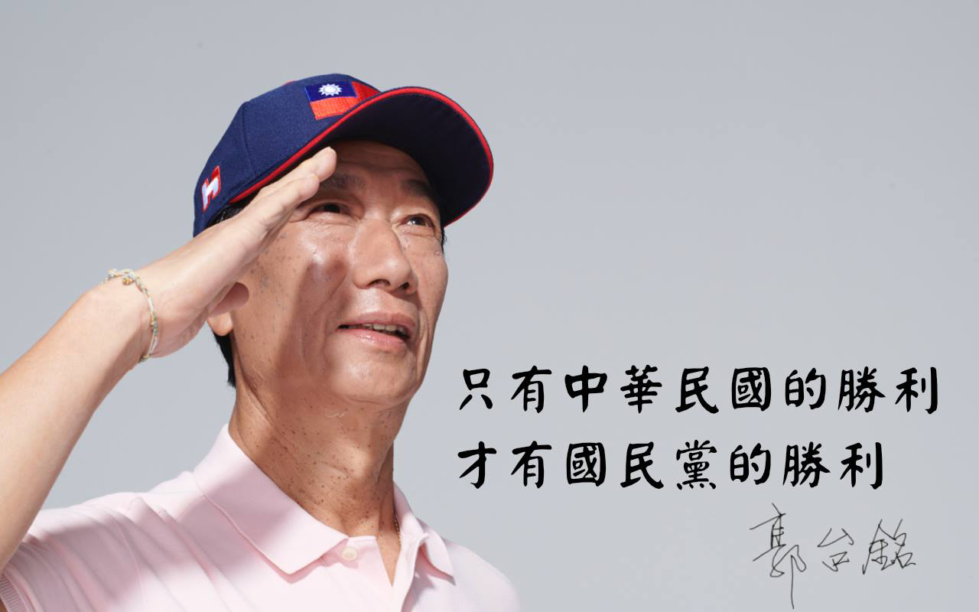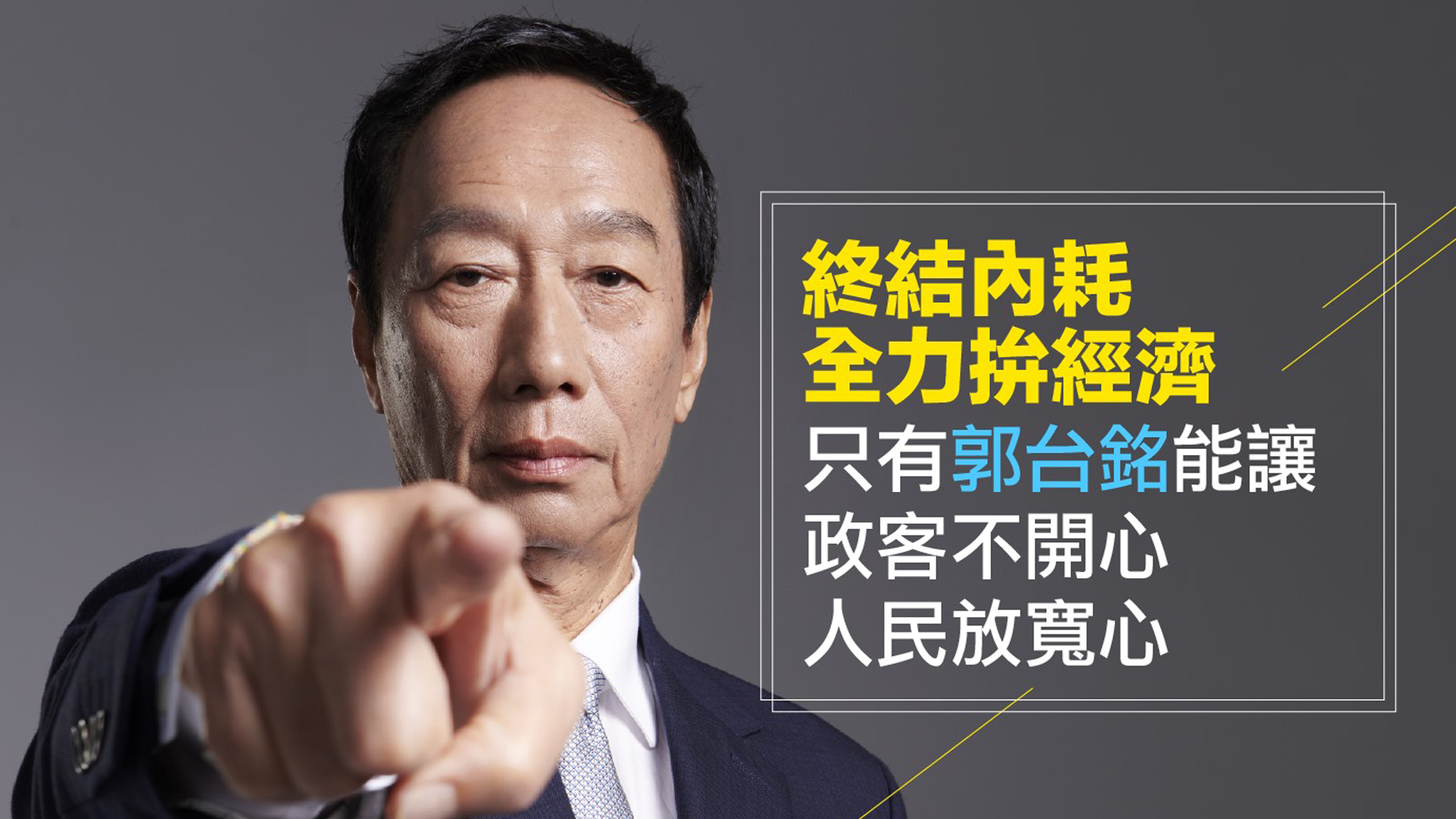I remember chuckling at the English-language media headlines when FoxConn CEO Terry Gou—Taiwan’s richest man, the owner of FoxConn, Apple’s largest iPhone manufacturer and the single largest employer in China—announced that he was planning on running for president. They read, “Foxconn Boss Runs for Office at Sea Goddess’ Command” and “Head of Foxconn, inspired by a sea goddess, announces Taiwan presidential bid.” Gou had claimed that the sea goddess Mazu had come to him in a dream and told him to run.

Photo: Lienyuan Lee/Panaramio
Mazu, originally a Fujianese shaman named Lin Mo or Lin Moniang, who lived from 960 to 987, is worshipped in Taiwan and China as part of religious traditions syncretic with Buddhism and Daoism. Mazu may not exactly be a well-known deity outside the Chinese-speaking world, but let’s face it, it is not uncommon for politicians to claim divine inspiration to run for office the world over. In the United States, the same impulse takes the form of “Jesus told me to run” or “I have a calling.”
Gou’s claim that his run was ordained by Mazu was a calculated political move, given the significant religious following Mazu has in Taiwan, and the connection of that following with politics. Mazu is the object of several major religious commemorations, most of which involve worshippers carrying sacred Mazu statues in palanquins between temples dedicated to Mazu. It is believed that the transmission of Mazu statues from temple to temple enhances their ability to spread fortune.

The Dajia Mazu pilgrimage, which travels 300 kilometers across nine days to commemorate Mazu’s birthday, can involve an estimated 200,000 pilgrims and five million participants across multiple cities. The Baishatun Mazu pilgrimage, which begins after the Lunar New Year, has no set parade route, and involves over forty temple stops; the route is determined by intuiting Mazu’s will by throwing divination blocks. As a result, the Baishatun Mazu pilgrimage has taken some odd routes, with Mazu deciding suddenly to stop at a supermarket, or to take a swim in a river. This pilgrimage also draws tens of thousands of attendees.
Given the veneration of Mazu in Taiwan, it’s not surprising that politicians have attempted to depict themselves as having gained her favor. Mazu pilgrims are believed to be blessed if the palanquin carrying the goddess passes over them, or if they carry the palaquin; politicians and even gangsters have tried to participate in Mazu pilgrimages. Just last April “White Wolf” Chang An-lo, a former gangster turned politician who carried out political assassinations for the Kuomintang during the authoritarian period, attempted to carry the Mazu palaquin at the Dajia pilgrimage, leading to clashes between hundreds of worshippers, gangsters, and police.

Mazu is esteemed both by members of the pan-Green camp in Taiwan, which leans toward political independence from China, and by the pan-Blue camp, which leans toward unification.
For members of the pan-Green camp, Mazu is a patron goddess of Taiwan—Taiwan being an island nation, and Mazu, a goddess of the sea. Furthermore, the Kuomintang’s attempts to stamp out folk religion led Mazu worship to become identified with resistance against the Kuomintang. On the other hand, for members of the pan-Blue camp Mazu is a goddess of Chinese origin, and they consider Taiwan as having always been a part of China. Kuomintang supporters link the Mazu temples in China and Taiwan, then, in order to create closer political ties.
In short, Mazu has been claimed for all sorts of causes—calls for political unification with China, calls for political independence from China, opposition to nuclear energy, and many others. Gou’s claim that Mazu came to him in a dream and called on him to run for office came not long after Fo Guang Shan Buddhist master Hsing Yun, an apparent Kuomintang supporter and a key figure in one of Taiwan’s largest Buddhist religious organizations, claimed that Tsai Ing-wen, Taiwan’s first female president, was Mazu herself personified.

Gou framed his presidential ambitions in the terms of Chinese traditional folk religion, and this was generally reported on in English-language media in vaguely exoticizing terms. Nevertheless, contemporary political discourse in Taiwan regarding a Gou run has a very distinctly American origin.
Whatever you might hear about the decline in global American power these days because of a rising China, the discursive weight of American politics and culture internationally is far from fading, and its influence cannot be underestimated. As soon as Donald Trump won the American presidency, political discourse around the world immediately began to consider whether this signaled the threshold of a new age of global authoritarians taking power. The power of Xi Jinping, unparalleled since Mao, the emergence of Rodrigo Duterte in the Phillipines, the victory of Jair Bolsonaro in Brazil—do these developments represent a new age of populism, or the beginning of a wave of wealthy, self-funded businessmen running for office? The latter possibility was much contemplated in Taiwan after Trump’s victory.
I remember being struck by how quickly political discussions in Taiwan turned to the possibility of Terry Gou running for president right after Trump’s victory. Gou has clearly had presidential ambitions going back for years, and I suspect that he saw it as in his interest to amplify the discourse around the idea that the world was entering a new age of businessmen seeking political office.
A similar discourse emerged around the presidential ambitions of Indonesian billionaire Hary Tanoesoedibjo. Though Tanoesoedibjo’s star seemed to fade, Tanoesoedibjo touted his presidential ambitions on the basis of his association with Trump through joint real estate projects.
Gou also has attempted to associate himself with Trump. His 2017 announcement of the construction of a large-scale Foxconn factory in Wisconsin, to bring American manufacturing jobs out of China and back to America, seemed aimed at building ties with Trump. Perhaps Trump’s ego would be tickled if Gou’s plans made Trump’s “America First” policy seem successful, and this, more than any genuine interest in building FoxConn factories in America, prompted the announcement; the stalling of the planned factory suggests a skeptical view is warranted. Also, the majority of FoxConn’s factories are in China, and Gou has a longstanding record of claiming that he intends to move FoxConn operations and then never following up on such promises, as in the case of long-delayed plans to relocate factories to India.
In building closer ties with Trump, who is uncritically celebrated by many in Taiwan because of his harsh rhetoric against China, Gou might mitigate one of his sharpest political liabilities—namely, that he is seen as starkly pro-China and pro-unification. This was likely his real aim.
Gou has even tried to imitate Trump’s style, notably by wearing a cap featuring the emblem of the Republic of China, Taiwan’s official name, everywhere he goes these days—all too remniscent of Trump’s red “Make America Great Again” hat. Gou could be attempting to allay the criticism that he is pro-China by claiming that he puts “Taiwan First” and will “Make Taiwan Great Again”. Gou even has more than one version of this risible hat, including red version, a blue version, a pink version, and a version of the hat on which the American and Republic of China flags are side by side.
If it surprises you that Trump’s victory in America set off a shockwave in political discourse halfway across the world, leading the man who runs the factories that make your iPhone to announce that a sea goddess told him to run for president, it honestly shouldn’t. Gou is a figure emblematic of our times, a transnational businessman playing America, China, and Taiwan off of each other for his own gain in the midst of the US-China trade war.
The extent to which Americans do not realize how American global political and cultural influence spreads into non-western parts of the world is surprising. This is particularly so for countries maintaining strategic security relationships with the United States or hosting American military bases.
Taiwan, which stopped hosting American military bases after America ceased official recognition of Taiwan in favor of China, has had a particular and paradoxical historical relationship with America. America has historically been the major guarantor of Taiwan’s de facto independence from China. That is just one factor in Taiwan’s cultural idealization of America—which is still strikingly clear, as evidenced by how little of Donald Trump’s incompetence seems to have registered even among otherwise sharp Taiwanese political commentators and public intellectuals, who seem to blandly accept the view that Trump is, in fact, a highly talented businessman and dealmaker with a grand master plan for world geopolitics.
The world is interlinked more than ever. It scares me sometimes how little we usually understand the precise ways in which our world is linked, however, or how few platforms exist for us to do so. (Hint: Donate to Popula!)
Those who write in English should be aware, too, of how disproportionately powerful the English language is in today’s world. Even half-baked thinkpieces on Donald Trump and his wealth or Donald Trump and populism can have unexpectedly powerful effects in other parts of the world. The circulation of ideas globally reflects world power.
As for Terry Gou, he will have to triumph over Han Kuo-yu, another highly populist candidate, for the Kuomintang’s presidential nomination. As Han seems to be supported by media mogul Tsai Eng-meng, Taiwan’s second richest man, some are calling the race a conflict between Taiwan’s richest man and second-richest man.
In the meantime, we can enjoy Gou’s laughable social media presence. His profile is a picture of himself with another picture of himself in the background. A picture of Gou standing next to Donald Trump examining an MRI machine gives the impression they are watching a man in a cremation oven.

Another picture he posted I interpret as the Gou family relaxing on a beach once they have wiped out the majority of humanity and what little is left are toiling in iPhone factories.
Gou is fully open about his agenda in running in democratic elections is to make sure that Taiwan becomes a part of China, in order that Taiwan no longer has anything resembling democratic elections or press freedom. All of Taiwan could become a giant island-sized factory, like the city-sized factory complex with a population of 350,000 in Zhengzhou, China where over half of iPhones are produced.
Maybe democracy always contains the seeds of its own undoing. People decide that they need gods or strongmen to rule over them and to make decisions for them, and are always too happy to hand over their rights to those who already have power.
It’s fully possible that the Taiwanese people are willing to elect a man who literally drives his workers to suicide, as observed in the eighteen attempted suicides in FoxConn factories in 2010, workers threatening mass suicide in 2012, as well as riots of thousands in FoxConn factories. I still find the poetry by one of the Chinese workers who killed himself, Xu Lizhi—who would be the same age as me, if he were still alive—to be endlessly haunting.






